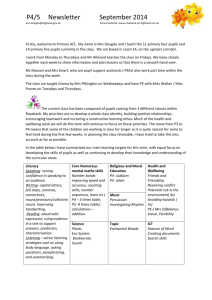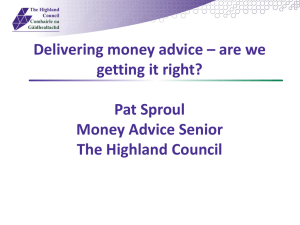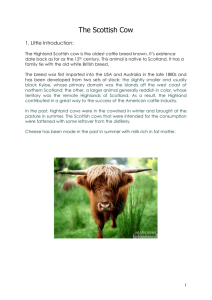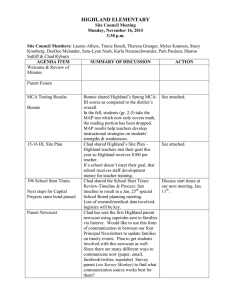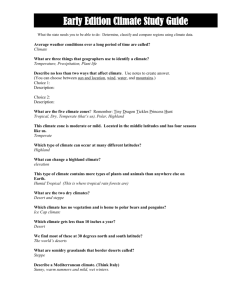Disclaimer: This learning journey was originally created as part of the... programme. Although the original purpose was to support learning...
advertisement
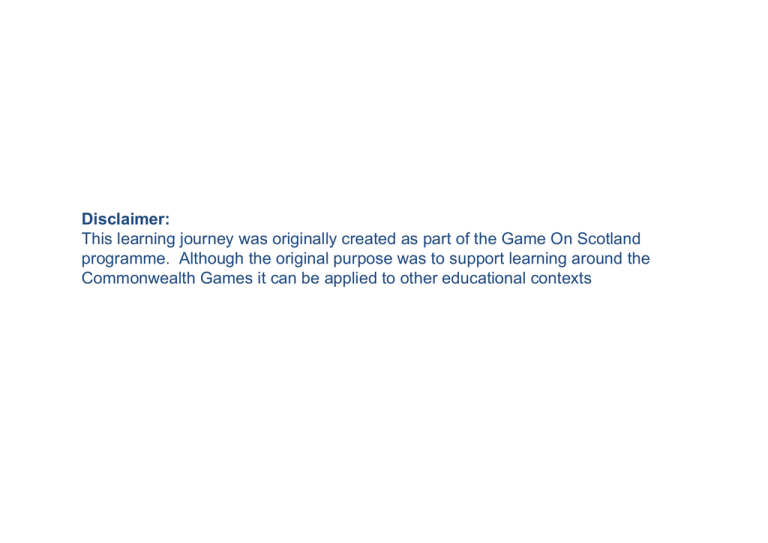
Disclaimer: This learning journey was originally created as part of the Game On Scotland programme. Although the original purpose was to support learning around the Commonwealth Games it can be applied to other educational contexts Learning journey – Gaelic culture Focus: Gaelic learners CfE Level: First / Second Introduction: This learning journey aims to increase pupils’ knowledge of Gaelic culture through the theme of the Highland Games in Scotland and other Commonwealth countries. Learners will research the origins of the Highland Games and the popularity within other Commonwealth countries. They will identify the different countries that celebrate the Highland games and investigate the various events that take place. Learners will become more familiar with the Gaelic culture and how it features within the games. They will gather information and compare the different styles of games, music and dance within other countries and present their findings in a variety of ways Finally, learners will have the opportunity to create their own Highland Games event, within their school setting, applying the knowledge they have gained. This learning journey contains the following learning experiences: • Origins of the Highland Games • Investigating music within other cultures • Creating dance • Planning own Highland Games Prior learning: Interdisciplinary opportunities: Capabilities: Pupils should have an awareness of traditional Scottish culture and national celebrations, such as Burns’ Day, St Andrew’s Day. Pupils should also know the countries within the Commonwealth. Numeracy and Maths Developing skills in reading maps of Scotland, Europe and the wider world - using appropriate terminology. Literacy Designing and creating posters, leaflets and programmes for the Highland Games. Expressive Arts Exploring Scottish dancing through demonstrations and participation, co-operating with peers. Health and Wellbeing Participating in Highland Games events individually and with others. Successful learners: Thinking creatively and independently. www.gameonscotland.org 1 Confident individuals: Develop and communicate their own opinions. Responsible citizens: Knowledge and understanding of different cultures around the world, including Scotland. Effective contributors: Work in partnership and in teams. Learning journey – Gaelic culture Focus: Gaelic learners CfE Level: First / Second C Relevant Experiences and Outcomes: Social Studies: • • • • • By exploring place, investigation artefacts and locating them in time, I have developed an awareness of the ways we remember and preserve Scotland’s history. SOC 1-02a I can investigate a Scottish historical theme to discover how past events or the actions of individuals or groups have shaped Scottish society. SOC 2-03a Through activities in my local area, I have developed my mental map and sense of place. I can create and use maps of the area. SOC 1-14a To extend my mental map and sense of place, I can interpret information from different types of maps and am beginning to locate key features within Scotland, UK, Europe or the wider world. SOC 2-14a I can discuss issues of the issues of the diversity of cultures, values and customs in our society. SOC 2-16c. Mathematics and numeracy: • • I can describe, follow and record routes and journeys using signs, words and angles associated with direction and turning. MTH 1-17a. Through practical activities which include the use of technology, I have developed my understanding of the link between compass points and angles and can describe, follow and record directions, routes and journeys using appropriate vocabulary. MTH 2-17c. Literacy: • • • • • • I can present my writing in a way that will make it legible and attractive for the reader, combining words, images and other features. LIT 1-24a. I consider the impact that layout and presentation will have and can combine lettering, graphics and other features to engage my reader. LIT 224a. By considering the type of text I am creating, I can select ideas and relevant information, organise these in a logical sequence and use words which will be interesting and/or useful for others. LIT 1-26a. By considering the type of text I am creating, I can select ideas and relevant information, organise these in an appropriate way for my purpose and use suitable vocabulary for my audience. LIT 2-26a. I can convey information, describe events or processes, share my opinions or persuade my reader in different ways. LIT 1-28a /LIT 1-29a. I can convey information, describe events, explain processes or combine ideas in different ways. LIT 2-28a. www.gameonscotland.org 2 Learning journey – Gaelic culture Focus: Gaelic learners CfE Level: First / Second Expressive Arts: • • • I am becoming aware of different features of dance and can practice and perform steps, formations and short dance. EXA 1-10a I have taken part in dance from a range of styles and cultures, demonstrating my awareness of the dance features. EXA 2-10a I have listened to a range of music and can respond by discussing my thoughts and feelings. I can give and accept constructive comment on my own and others’ work. EXA 1-19a / EXA 2-19a. Health and Wellbeing: • • Within and beyond my place of learning, I am enjoying daily opportunities to participate in physical activities and sport, making use of available indoor and outdoor space. HWB 1-25a I am experiencing enjoyment and achievement on a daily basis by taking part in different kinds of energetic physical activities of my choosing, including sport and opportunities for outdoor learning, available at my place of learning and in the wider community. HWB 2-25a. www.gameonscotland.org 3 Learning journey – Gaelic culture Focus: Gaelic learners CfE Level: First / Second Learning experience A: The origins of the Highland Games Introduction Possible learning opportunities / tasks Possible evidence Pupils will be researching the origins of the Highland Games and locating what Commonwealth countries hold these events. • Learners can: Say - Demonstrate knowledge of Highland Games within Commonwealth countries through class discussion Stimulus Look at Visit Scotland website and discuss http://www.visitscotland.com/about/artsculture/uniquely-scottish/highland-games • Key learning • Learners can: • Research and locate key information using ICT • Working co-operatively in pairs/small groups • Read and interpret maps • Collect and organise information Use ICT to find out the history of the Highland Games and record where and when the first Highland games took place. Pupils could list the events. Pupils can do further research of the events if required Find out which Commonwealth countries hold Highland Games and record this in pairs/small group. Pupils could then label the countries on a world map Pupils could find out the location of their closest Highland Games and the events that will take place. Useful resources Video clip about the Braemar Games in 1926 http://www.britishpathe.com/video/braemargathering-5 Some facts about The Highland Games http://www.scotland.org/features/highland-gamesdid-you-know The Scottish Highland Games Association Information about what to expect at an event. Interactive map and information about official Highland Games within Scotland http://www.shga.co.uk/visitors.php www.gameonscotland.org 4 Make – Map of world with Commonwealth countries that hold Highland games in 3D Write – Record accurate information in a table Do – Label World Map. Reflecting on learning Reflective questions for learners: Did you share responsibility equally within your pair/group? Did you use a range of sources? Did you write down your findings in your own words? Taking it further • • Make a 3D map of Scotland Link up with a school within a place in the Commonwealth that holds Highland Games Learning journey – Gaelic culture Focus: Gaelic learners CfE Level: First / Second Learning experience B: Investigating music within other cultures Introduction Pupils will familiarise themselves with traditional Scottish music, within the Highlands and other cultures. Possible learning opportunities / tasks • • Stimulus Red Hot Chilli Pipers clip http://www.youtube.com/watch?v=Pn2tj49DO WY&list=ALHTd1VmZQRNqqzsQ_jjqmLiP4qU hpIO4o Key learning Learners can: • Demonstrate awareness that music varies from culture to culture and that there are some features e.g. rhythm and instrumental timbre that characterise this music • Listen carefully and be able to recognise identifying features in music from Scotland and from other countries and cultures • • Listening to Scottish music excerpts as a class and discuss the key features eg, tempo, rhythm and instruments. Identify and record specific instruments within a piece of Scottish music in pairs Listen to music from other countries within the Commonwealth and discuss the key elements eg, tempo, rhythm and instruments Compare Scottish music with music from another culture Useful resources Examples Scottish music for a variety of purposes http://www.educationscotland.gov.uk/scotlandssongs /primary/index.asp African culture http://www.africanculturalcenter.org/5_4_2music.html Music from Ghana and information http://www.african-musicdance.com/#music%20and%20sound%20effects Possible evidence Learners can: Say - Describe the key features within a piece of Scottish Music Make – Create a Powerpoint to show differences between Scottish music and music from another country Write – recording instruments within a piece of Scottish Music Do – Listen and record key elements in pieces of music. Reflecting on learning Did you find it challenging to hear multiple instruments within a piece of music? What was your opinion about music from other cultures? Taking it further • • www.gameonscotland.org 5 Investigate other country’s national dress and traditions Different groups/pairs learn different national song within the Commonwealth and then showcase them at an assembly. Learning journey – Gaelic culture Focus: Gaelic learners CfE Level: First / Second Learning experience C: Creating dance Introduction Pupils will be familiarising themselves with traditional Scottish dance within the Highlands and within other cultures. Possible learning opportunities / tasks • Watch performances of Scottish dancing, such Stimulus • Video clip of Highland Dancing http://www.bbc.co.uk/learningzone/clips/highla nd-dancing/12328.html. • Key learning Learners can: • Be aware that Scottish dance consists of movements and gestures put together in a special way and performed with music or a beat • Learn and perform a variety of different styles of dance from different cultures. • Compare Scottish dance with other national dances • Learn, rehearse and perform a simple dance sequence • Reflect on their own and others’ performance and composition. www.gameonscotland.org • Possible evidence Learners can: Say- Discussion about comparison of Scottish dance and another country's national dance as Highland fling, Sword dance and the Flora. Record key movement eg, footwork and hand positions Investigate national dances of other Commonwealth countries and discuss the differences with Scottish Dancing. Learn a national dance from another country eg, The Haka Make – a comparison between Scottish dance and another national dance Learn the Highland Fling and other Scottish dances Were you surprised at the number and range of different Scottish dances? Useful resources The Haka and Maori culture http://www.newzealand.com/uk/feature/haka/ Dance from Ghana http://video.nationalgeographic.com/video/exploreorg /ghana-drum-dance-eorg Scottish dancing clips and information http://www.electricscotland.com/dance/intro.htm 6 Do – Perform the Highland Fling. Reflecting on learning Which other national dance stood out to you? Justify your answer Taking it further • • • Write a newspaper report about the day Class trip to Highland Games or similar event Consider inter-school Highland Games. Learning journey – Gaelic culture Focus: Gaelic learners CfE Level: First / Second Learning experience D: Planning own Highland Games Introduction Pupils will plan and run their own Highland Games event at class, school or Authority level. Possible learning opportunities / tasks • Stimulus Pupils should reflect on what they have learned so far about the Highland Games and take that forward into their own planning.. Key learning Learners can: • Use literacy, communication and numeracy skills • Work in partnership and teams • Demonstrate enterprising attitude. • • • Gather information about current Highland game set up from prior research and ICT. From this, pupils can choose what events they wish to include within own class/school event. Pupils to then create detailed plans for each event ie, minimum/maximum number of participants, rules and locations. Possible events could include athletics ( 100m, 200m,400m and relay race), tug of war, toss the welly, highland dancing, chanter etc Pupils should practice the events through PE time and/or at a lunch time/after school club. Pupils could write a letter to their headteacher to discuss arrangements and finer details about their plans for the Games. Design and create advertisement to promote the Highland Games, including a programme for the day Useful resources Examples of programmes of event and a poster http://www.aberdeencity.gov.uk/nmsruntime/saveasdi alog.asp?lID=50956&sID=5842 http://www.braemargathering.org/events.htm http://www.arisaighighlandgames.co.uk/runningorder.html http://mileendpc.co.uk/pta-picnic-tickets-onsale.html/pta-poster-highland-games-1a3-poster www.gameonscotland.org 7 Possible evidence Learners can: Say - Class discussion about what events to include Make – Create a programme and posters for event Do – Participate in the games Write – Letter to headteacher Reflecting on learning Were your events age appropriate? How effective did you work with your team? Taking it further • • Learn a variety of different country’s national dance and perform to an audience Have a Scottish ceilidh.
